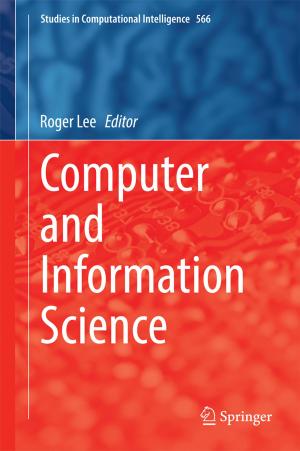Advanced Undergraduate Quantum Mechanics
Methods and Applications
Nonfiction, Science & Nature, Mathematics, Applied, Science, Physics, Quantum Theory| Author: | Lev I. Deych | ISBN: | 9783319715506 |
| Publisher: | Springer International Publishing | Publication: | April 5, 2018 |
| Imprint: | Springer | Language: | English |
| Author: | Lev I. Deych |
| ISBN: | 9783319715506 |
| Publisher: | Springer International Publishing |
| Publication: | April 5, 2018 |
| Imprint: | Springer |
| Language: | English |
This introduction to quantum mechanics is intended for undergraduate students of physics, chemistry, and engineering with some previous exposure to quantum ideas. Following in Heisenberg’s and Dirac’s footsteps, this book is centered on the concept of the quantum state as an embodiment of all experimentally available information about a system, and its representation as a vector in an abstract Hilbert space. This conceptual framework and formalism are introduced immediately, and developed throughout the first four chapters, while the standard Schrödinger equation does not appear until Chapter 5.
The book grew out of lecture notes developed by the author over fifteen years of teaching at the undergraduate level. In response to numerous requests by students, material is presented with an unprecedented level of detail in both derivation of technical results and discussion of their physical significance. The book is written for students to enjoy reading it, rather than to use only as a source of formulas and examples. The colloquial and personal writing style makes it easier for readers to connect with the material. Additionally, readers will find short, relatable snippets about the “founding fathers” of quantum theory, their difficult historical circumstances, personal failings and triumphs, and often tragic fate. This textbook, complete with extensive original end-of-chapter exercises, is recommended for use in one- or two-semester courses for upper level undergraduate and beginning graduate students in physics, chemistry, or engineering.
This introduction to quantum mechanics is intended for undergraduate students of physics, chemistry, and engineering with some previous exposure to quantum ideas. Following in Heisenberg’s and Dirac’s footsteps, this book is centered on the concept of the quantum state as an embodiment of all experimentally available information about a system, and its representation as a vector in an abstract Hilbert space. This conceptual framework and formalism are introduced immediately, and developed throughout the first four chapters, while the standard Schrödinger equation does not appear until Chapter 5.
The book grew out of lecture notes developed by the author over fifteen years of teaching at the undergraduate level. In response to numerous requests by students, material is presented with an unprecedented level of detail in both derivation of technical results and discussion of their physical significance. The book is written for students to enjoy reading it, rather than to use only as a source of formulas and examples. The colloquial and personal writing style makes it easier for readers to connect with the material. Additionally, readers will find short, relatable snippets about the “founding fathers” of quantum theory, their difficult historical circumstances, personal failings and triumphs, and often tragic fate. This textbook, complete with extensive original end-of-chapter exercises, is recommended for use in one- or two-semester courses for upper level undergraduate and beginning graduate students in physics, chemistry, or engineering.















